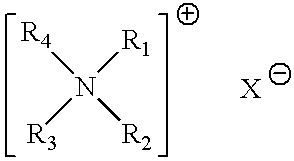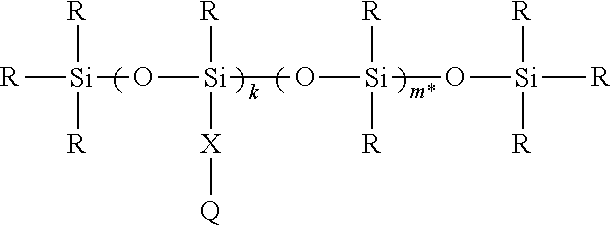Fabric softening laundry detergent
a fabric softening and laundry detergent technology, applied in detergent compounding agents, liquid soaps, organic chemistry, etc., can solve the problems of unsightly residues, difficult to simultaneously clean (remove) and soften (deposit) fabrics through the wash, and time-consuming and expensive two or three step processes, so as to avoid unsightly residues and maintain good cleaning
- Summary
- Abstract
- Description
- Claims
- Application Information
AI Technical Summary
Benefits of technology
Problems solved by technology
Method used
Image
Examples
example i
Residue Testing
[0123]The presence of residues is assessed in a full scale washing machine test using Miele Novotronic W527.
Residue Protocol:
[0124]1. The fabric used to assess residues on fabrics is a black velvet (Material source: Denholme Velvets, Halifax Road, Denholme, Bradford, West Yorkshire, England BD13 4EZ—tel. (01274) 832 646, with the specifications 150 cm C.R. Cotton Pile Velvet, quality 8897, black, 72% Cotton, 28% Modal).[0125]2. A pouch is made by sewing a rectangle of black velvet (dimensions 23.5 cm×47 cm that is folded to make a square with the velvet on the inside) using an overlock stitch, sewing along two sides leaving one open edge. The pouch is turned inside out so that the velvet is on the outside.[0126]3. A dosing ball is filled using the recommended dosage for each product according to packaging instructions for normal / median soil and normal / median water hardness (125 g). For every experiment, a new and unused dosing ball is filled. The dosing ball is placed...
example ii
Softness Testing
[0137]The relative softness of fabrics washed in laundry products containing polymers is assessed in a full scale washing machine test using Miele Novotronic W527.
Softness Protocol
[0138]Fabric softness is a relative characteristic that in this protocol is evaluated by trained human softness graders that tactically examine a range of white fabric swatches washed in commercially available washing machines with standard dosages of laundry detergent. Identical sets of fabric swatches are separately washed in a reference detergent product and in a test product. The softness results are a comparison of the resulting fabric swatches from each test product wash with the fabrics from the reference detergent product wash using the PSU score described below. All data are generated by using commercially available washing machines manufactured by Miele and sold as the Novatronic W527 model and commercially available laundry dryers manufactured by Miele and sold as the Novotronic ...
example iii
Detergent Compositions
[0159]Additional detergent composition examples according to the present invention are shown as compositions 3A and 3B, below. It is predicted that these formulations will provide good cleaning, softness and acceptably low visible residues on fabrics when used in traditional consumer washing machines.
[0160]
Ingredients (% by weight)3A3BAlkylbenzene sulfonic acid—3.0C14-15 alcohol 8-ethoxylate—2.5C12-14 alcohol 3-ethoxylate sulphate, Na2212saltN-C10-12 alkyl, N-2-hydroxyethyl, N,N-3.01.5dimethyl ammonium chlorideCitric acid3.51.0C12-18 fatty acid2.07.0Copolymers 2, 3 and / or 7 from Table 70.250.28aboveSilicone polyether2.02.0Detergent enzymes0.41.1Ethoxylated polyimine1.32.0Pentamethylene triamine pentaphosphonic—0.3acidHydrogenated castor oil—0.21,2 propandiol5.50.2Cumene sulfonic acid, Na salt1.5—Ethanol3.02.2Monoethanolamine (MEA)2.710Boric acid0.91.5Sodium hydroxide3.03.0Perfume0.60.7Water4759Dyes, miscellaneous minorsbalancebalance
PUM
| Property | Measurement | Unit |
|---|---|---|
| mole ratio | aaaaa | aaaaa |
| particle size | aaaaa | aaaaa |
| mole ratio | aaaaa | aaaaa |
Abstract
Description
Claims
Application Information
 Login to View More
Login to View More - R&D
- Intellectual Property
- Life Sciences
- Materials
- Tech Scout
- Unparalleled Data Quality
- Higher Quality Content
- 60% Fewer Hallucinations
Browse by: Latest US Patents, China's latest patents, Technical Efficacy Thesaurus, Application Domain, Technology Topic, Popular Technical Reports.
© 2025 PatSnap. All rights reserved.Legal|Privacy policy|Modern Slavery Act Transparency Statement|Sitemap|About US| Contact US: help@patsnap.com



